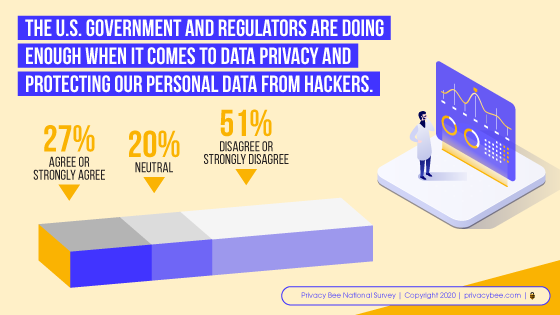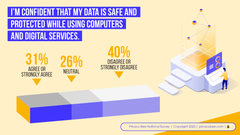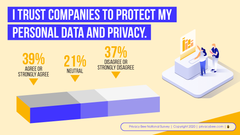Americans overwhelmingly support a national privacy law — yet distrust the government to deliver data privacy
October 26, 2020 (PRLEAP.COM) Technology News
For 74% of Americans, "it's about time" that America has a national privacy law. But regulators aren't delivering — and most Americans don't trust companies or the government to protect their data. With only 27% of respondents believing that the U.S. government and regulators are doing enough to protect data privacy, there's a major trust gap. That gap seems to be only widening in a year with data privacy concerns around elections and contact tracing, as well as a citizen-led privacy initiative on the California ballot.
If the nation takes California's lead, what would a national privacy law look like? What rights do consumers want? And how can we rebuild trust in companies and institutions around data privacy?
What Americans expect from a national privacy law
Most Americans want more control over their data and their privacy. Americans say the following privacy rights are important or very important:
The right to an expiration date is especially notable. Some brands already allow users to delete data after a certain point, such as Google's auto-delete controls for Location History and Web & App Activity. But the ability to choose how long personal data can be shared, held, or otherwise used by a corporation would be a big step towards complete data privacy control.
"The U.S. government and regulators have an opportunity to give citizens what they crave — a national approach to privacy that offers consistency and control," says Privacy Bee CPO Chris Worrell
The current state of privacy
Everyone deserves their privacy. When it comes to privacy, Privacy Bee's survey found a disconnect between what consumers expect and what they're getting.
While 82% agree or strongly agree that privacy management should be convenient and easy, that's not what's happening.The most frequent words used to describe the state of privacy management were "difficult," "complicated," "confusing," and "powerless." The vast majority of feelings were negative, underscoring just how frustrated Americans are with how difficult it is to take control of their personal data.
"It shouldn't be difficult or confusing to exercise your privacy rights," Worrell says. "But that's not what's happening: the majority of consumers feel that privacy management isn't living up to their expectations. There should be greater data controls, consistently and uniformly applied across the country."
There's also low confidence among many consumers in the overall safety and privacy protection of our digital lives. And there's a large chunk of the country that isn't quite sure about their data's safety — a warning sign that corporations and governments aren't doing enough to protect consumers.
Only 31% are confident that their personal data is safe and protected while using computers and digital services. Interestingly enough, 26% are neutral, which underscores the continued importance of education around data protection best practices.
The U.S. government could also do more to protect citizens. Politicians and regulators have an opportunity to give citizens what they crave — a national approach to privacy that offers consistency and control.
51% disagree or strongly disagree that the government is doing enough when it comes to data privacy and protecting our personal data from hackers.
Clearly, more must be done to legally empower citizens with rights to manage and protect their data privacy. It comes down to aligning incentives around data controls in the commercial context, says Lee Thien, Electronic Frontier Foundation's Legislative Director and Adams Chair for Internet Rights in response to the survey results:
"We share personal information with people as part of daily life. But the moment you shift to the commercial world, many companies have a bad business model for privacy because there are incentives to use and exploit the data. Even companies that don't have a strong incentive to do that still might have no strong incentive to protect users."
Without that framework in place to balance incentives and tip the scales back in consumers' favor, there's going to be a continued disconnect between what Americans expect around data privacy and what elected representatives deliver.
Download the full report 'What Americans Want from a National Data Privacy Law' here: http://bit.ly/PrivacySurvey2020.
Attachments




